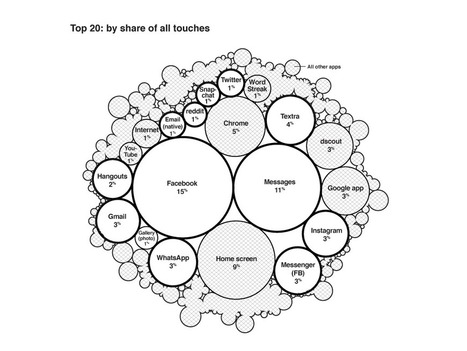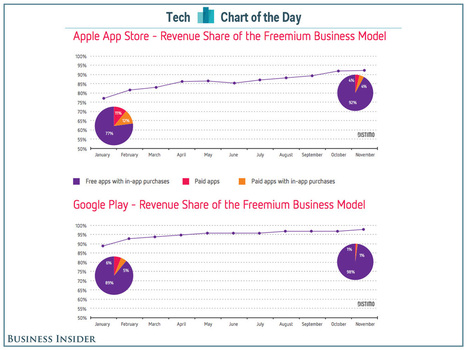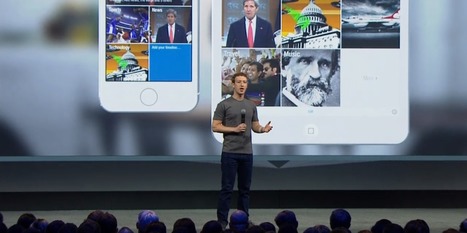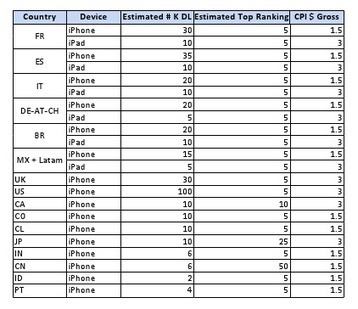 Your new post is loading...
 Your new post is loading...
Apple shut down Google’s ability to distribute its internal iOS apps earlier today. A person familiar with the situation told The Verge that early versions of Google Maps, Hangouts, Gmail, and other pre-release beta apps stopped working alongside employee-only apps like a Gbus app for transportation and Google’s internal cafe app. The block came after Google was found to be in violation of Apple’s app distribution policy, and followed a similar shutdown that was issued to Facebook earlier this week.
TechCrunch and Bloomberg’s Mark Bergen reported late Thursday that the apps’ functionality had been restored; Apple appears to have worked more closely with Google to fix this situation. “We are working together with Google to help them reinstate their enterprise certificates very quickly,” an Apple spokesperson earlier told BuzzFeed.
APPLE BLOCKED FACEBOOK AND THEN GOOGLE
Apple’s move to block Google’s developer certificate comes just a day after Google disabled its Screenwise Meter app following press coverage. Google’s private app was designed to monitor how people use their iPhones, similar to Facebook’s research app. Google’s app also relied on Apple’s enterprise program, which enables the distribution of internal apps within a company.
In an earlier statement over Facebook’s certificate removal, Apple did warn that “any developer using their enterprise certificates to distribute apps to consumers will have their certificates revoked.” Facebook’s internal iOS apps have since resumed functioning, as the social network said this afternoon that Apple had restored its enterprise certificate.
Apple is clearly sticking to its rules and applying them equally to Facebook, Google, and likely many other companies that get caught breaking Apple’s rules in the future.
There’s growing evidence that a number of companies are using Apple’s enterprise program to distribute apps to consumers. iOS developer Alex Fajkowski has discovered that Amazon, DoorDash, and Sonos all distribute beta versions of their apps to non-employees. Apple may be forced to take action against these apps, or to even revamp its entire enterprise program in the future.
Update 1/31, 5:45PM ET: Article updated with comment from Google, Apple, and details on other companies using Apple’s enterprise program to distribute apps.
Update 1/31: 6:18PM ET: Updated with the news that Apple has resumed letting Facebook use internal iOS apps.
Update 1/31: 10:30PM ET: Updated with the news that Apple has restored functionality to Google’s apps.
We all know life hasn’t been the same since Apple launched the iPhone nearly ten years ago. That little screen is always nearby—in our pocket or backpack, on the nightstand or under the pillow—beckoning us. Each of us feels the pull, and it’s hard to dimensionalize. How much are we really attached to our phones physically, cognitively… emotionally? As people nerds, the dscout research team exists to understand that pull. When we first dug in, what we discovered was a dearth of good data. Pundits have long tossed about statistics for how often we use our phones, but pretty much everyone references the same 2013 Kleiner Perkins report citing 150 mobile sessions a day—and often that number, now three years old, is taken out of context. We decided to dig for some data of our own. dscout’s web-based research platform pairs with a smartphone app to capture in-the-moment behaviors. For this study, we recruited a demographically diverse sample of 94 Android users from our pool of more than 100,000 participants. Then we built a supplementary smartphone tool to track every user’s interaction across 5 days, 24 hours a day. And by every interaction, we mean every tap, type, swipe and click. We’re calling them touches. Like a Greek tragedy, what we learned was simultaneously expected and astonishing—and a little bit sad. What follows are insights to help you better understand the intensity of the mobile life your users live, so your brand, products and strategies can become part of it.
Microsoft and Apple are currently locked in something of a Cold War over the future of SkyDrive in the iOS App Store.
Sources close to Microsoft have detailed to TNW a difficult, and perhaps unresolvable situation between the two companies that underscores the difficulty with certain Apple rules concerning its app marketplace, and how far the company is willing to go to protect its vaunted 30% cut of in-app revenues.
The difficulty began when Microsoft rolled out the ability for SkyDrive users to purchase more storage space on the service. From that point, the company was not permitted to update its application in the iOS App Store.
The reason? It doesn’t pay Apple a 30% cut of subscription revenue generated by the application through the paid, additional storage. Microsoft, TNW has learned, has a new version of the application ready to go, including a key bug fix that would rectify a crashing bug, but cannot get it through.
Microsoft does not appear keen to pay Apple the 30% cut, as it lasts in perpetuity, regardless of whether a user continues to use an iOS device or not, as the billing is through their Apple account.
Therefore, if a user signed up for a few additional gigabytes on their iOS device, and then moved to Android or Windows Phone or not phone at all, for the length of their account, Apple would collect 30% of their fee for storage. This hasn’t sat well with Microsoft.
Microsoft has persisted in trying to work out a compromise with Apple, but has thus far failed to come to an agreement. The company offered to remove all subscription options from its application, leaving it a non-revenue generating experience on iOS. The offer was rebuffed.
If a service has a subscription option, it seems, and it is not listed in the iOS store, the application cannot, and will not be allowed. That is, unless you are small enough that Apple doesn’t bothers to check. I assume that smaller companies could slip under the radar.
"Mobile brings the (online store) to the store." : according to Walmart about 15% of page views for their mobile app come from shoppers in stores.
|
Data reviewed by The Times shows over 235 million locations captured from more than 1.2 million unique devices during a three-day period in 2017. The millions of dots on the map trace highways, side streets and bike trails — each one following the path of an anonymous cellphone user. One path tracks someone from a home outside Newark to a nearby Planned Parenthood, remaining there for more than an hour. Another represents a person who travels with the mayor of New York during the day and returns to Long Island at night. Yet another leaves a house in upstate New York at 7 a.m. and travels to a middle school 14 miles away, staying until late afternoon each school day. Only one person makes that trip: Lisa Magrin, a 46-year-old math teacher. Her smartphone goes with her. An app on the device gathered her location information, which was then sold without her knowledge. It recorded her whereabouts as often as every two seconds, according to a database of more than a million phones in the New York area that was reviewed by The New York Times. While Ms. Magrin’s identity was not disclosed in those records, The Times was able to easily connect her to that dot. The app tracked her as she went to a Weight Watchers meeting and to her dermatologist’s office for a minor procedure. It followed her hiking with her dog and staying at her ex-boyfriend’s home, information she found disturbing. “It’s the thought of people finding out those intimate details that you don’t want people to know,” said Ms. Magrin, who allowed The Times to review her location data. Like many consumers, Ms. Magrin knew that apps could track people’s movements. But as smartphones have become ubiquitous and technology more accurate, an industry of snooping on people’s daily habits has spread and grown more intrusive. Lisa Magrin is the only person who travels regularly from her home to the school where she works. Her location was recorded more than 800 times there, often in her classroom . A visit to a doctor’s office is also included. The data is so specific that The Times could determine how long she was there. Ms. Magrin’s location data shows other often-visited locations, including the gym and Weight Watchers. In about four months’ of data reviewed by The Times, her location was recorded over 8,600 times — on average, once every 21 minutes.
Last year, it took a shot at creating its own pseudo mobile operating system with Facebook Home, an Android app that replaced your home screen with a pretty stream of photos and updates from your Facebook feed. It was a dud. Then there were the series of separate mobile apps like Poke, Camera, and Paper that have largely failed to resonate with people. Most seem to be happy with the regular Facebook app, Instagram, and Facebook Messenger. But at today's F8 developers conference, Facebook unveiled some new tools that will give Facebook a deeper level of control over your phone, no matter what kind of device you use. The most important one is called App Link, a tool that developers can use to help their apps and websites talk to each other. To use Facebook's example, imagine looking up a movie review on your phone on the mobile Rotten Tomatoes site. Well, what happens if you want to use the Fandango app to buy tickets to that movie? As things stand now, you'd have to close out your browser, launch the Fandango app, and then search for the movie again. With App Link, the Rotten Tomatoes developers would be able to provide you with a link that lets you jump right into the movie's ticket page in the Fandango app. In theory, it's seamless. That process is also called deep linking, and it's been a messy problem for app developers until now. Apple, Google, and Microsoft don't make it very easy for developers to use deep linking on their respective mobile operating systems. App Link is open for any developer to use, so over the next few months you can expect to see more and more of your apps start playing nicely with each other.
Apple said it removed AppGratis for violating a clause in the iOS developer guidelines that prohibits apps from mimicking the official App Store. But there's a disconnect between AppGratis's official statements about how it promotes apps and how it attracts developers for such promotion. Specifically, AppGratis gives developers an estimate of where in Apple's App Store rankings an App can land based on how much the developer is willing to pay, according to a document from the company's pitch that a source in the developer community sent us. For example, this document shows AppGratis estimates a ~$300,000 buy will land an app in the top five slot in the US version of the App Store.
UI design is about maintaining consistency while expanding possibilities. Looks like Facebook's latest iOS update does the opposite... Today facebook changed (once again) the gestures that everybody knew by now (given the high usage rate of the app), which will induce latency, friction and frustration from single handed, zero attention span millions of users. But maybe one can see some wisdom in such choices, that over time may be progressively forgotten. More frustrating are some feature reductions, namely in the photo area of the app that now longer allows posting pictures that are not in the camera roll. For instance, it is no longer possible to enrich a post with a photo picked in an existing album, including the photostream. This is a big restriction in terms of features and UI, with no understandable reason. Please voice your comments and reactions.
Beyond an impressive (and long awaited) speed and UX improvement, facebook's last iOS release raises the HTML5 vs.native apps debate to a whole new level
|




 Your new post is loading...
Your new post is loading...

















Apple sends Facebook and Google a real, serious warning when it comes to mixing enterprise and consumer iOS app deployment.
May this be the next step in Apple's crusade against "the consumer is the product" giant proponents ?